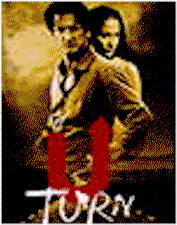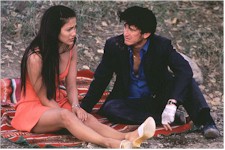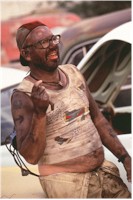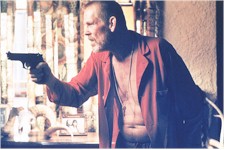|
| |
U-Turn
Review by Carrie
Gorringe
Posted 3 October 1997
 |
|
Directed by Oliver Stone Starring Sean Penn, Jennifer Lopez,
Nick Nolte, Powers Boothe,
Claire Danes, Joaquin Phoenix,
and Billy Bob Thornton.
Screenplay by John Ridley,
from his novel, Stray Dogs |
Con man Bobby Cooper (Penn) is
heading for Las Vegas in the hopes of clearing a rather large gambling debt owed to a
rather vicious individual whose idea of giving people a break on their loans has to do
with the liberal application of a sledgehammer to the deadbeat’s shins. His good luck
evaporates just outside of a hellhole ironically named Superior, Arizona, when a rad hose
decides to give out. This bad break puts him at the mercy of several local grotesqueries,
least of which is the local "mechanic," Darrell (Thornton), who continually
raises the ante on getting Cooper’s car released from automotive custody.  Next in line are the
McKennas. Lured by the beauty of sultry Grace (Lopez), Cooper soon finds himself
confronted by her beast of a husband, Jake (Nolte), the closest thing this geographic
exercise in hell has to a powerhouse. Cooper discovers that both participants in the
McKenna marriage would be more than happy to eliminate the high financial cost of divorce
by eliminating each other, and Cooper becomes the device of choice for both. While he
ponders which offer to take, he is periodically assaulted by the vacuousness flirting of
the local dimwitted floozy (Danes) and her hysterically jealous boyfriend (Phoenix). The
local sheriff (Boothe) also has this newcomer under surveillance. Cooper might have left
this madhouse much sooner, if his money hadn’t been, well, liquidated in a robbery at
Superior’s only general store. Now, even the loanshark is after him. Desperate,
exhausted, broke and under Grace’s spell, the weak-willed Cooper has to make a
decision: to help Grace or to help Jake? Next in line are the
McKennas. Lured by the beauty of sultry Grace (Lopez), Cooper soon finds himself
confronted by her beast of a husband, Jake (Nolte), the closest thing this geographic
exercise in hell has to a powerhouse. Cooper discovers that both participants in the
McKenna marriage would be more than happy to eliminate the high financial cost of divorce
by eliminating each other, and Cooper becomes the device of choice for both. While he
ponders which offer to take, he is periodically assaulted by the vacuousness flirting of
the local dimwitted floozy (Danes) and her hysterically jealous boyfriend (Phoenix). The
local sheriff (Boothe) also has this newcomer under surveillance. Cooper might have left
this madhouse much sooner, if his money hadn’t been, well, liquidated in a robbery at
Superior’s only general store. Now, even the loanshark is after him. Desperate,
exhausted, broke and under Grace’s spell, the weak-willed Cooper has to make a
decision: to help Grace or to help Jake?
Many comparisons have been made between U-Turn and its presumed
predecessors in film noir; one critic referred to the film as Touch of
Evil mixed with Duel in the Sun. Stone himself prefers to think of U-Turn
as more of a western than a noir piece. A more immediate comparison might be made
between U-Turn and John Dahl's 1993 neo-noir, Red Rock West.
However, in terms of narrative structure, U-Turn’s closest cinematic
"relative" really has to be the Edgar G. Ulmer noir classic from 1946, Detour.
Both films share the common dilemma of a spineless antihero caught in a relentlessly
downward spiral, a position exacerbated by allowing a sinister female into his life.  Every more he takes to
extricate himself just causes the level of misery to accelerate. Not surprisingly, this
type of noir can be extremely difficult for the audience to tolerate for very long,
precisely because the grim route taken by the antihero is so lacking in self-awareness
that, under the force of an overwhelmingly negative pressure-cooker atmosphere, disgust
mixed with despair soon sets in – a fatal combination of forces with which to hold an
audience in thrall. However, because of studio and budgetary considerations (the film was
shot over four days), Ulmer was obliged to keep the torture down to sixty-nine minutes of
running time; these factors saved Detour from becoming a B-movie exercise in
nihilistic self-indulgence and rendered it a minor masterpiece in retrospect. Just as Detour
began to tax the nerves beyond endurance, the ending, with its macabre twist, intervened
to save everyone from nervous enervation. In this case, it was better to end the downbeat
on the upbeat. Every more he takes to
extricate himself just causes the level of misery to accelerate. Not surprisingly, this
type of noir can be extremely difficult for the audience to tolerate for very long,
precisely because the grim route taken by the antihero is so lacking in self-awareness
that, under the force of an overwhelmingly negative pressure-cooker atmosphere, disgust
mixed with despair soon sets in – a fatal combination of forces with which to hold an
audience in thrall. However, because of studio and budgetary considerations (the film was
shot over four days), Ulmer was obliged to keep the torture down to sixty-nine minutes of
running time; these factors saved Detour from becoming a B-movie exercise in
nihilistic self-indulgence and rendered it a minor masterpiece in retrospect. Just as Detour
began to tax the nerves beyond endurance, the ending, with its macabre twist, intervened
to save everyone from nervous enervation. In this case, it was better to end the downbeat
on the upbeat.
Unfortunately, this is not the tack taken by Stone and Ridley. The
problem doesn’t stem from the traditional sources of too much money and too much time
for shooting (Stone, to his credit, shot U-Turn for twenty million dollars – a
veritable fire-sale price in contemporary Hollywood – and in forty-two days, almost a
third less time than is normal for him).  Had the two also employed economy in crafting the plot structure,
everything should have worked out according to plan. Instead, they allow events in
Superior, Arizona to drag out endlessly for at least half an hour too long. There
aren’t enough unique plot variations suggested by the environment to effectively
nurture this delay (cities are a better setting for this type of film, suggesting, as they
do, a myriad of possibilities denied to your average one-horse hamlet), so Stone and
Ridley are reduced to piling devastation upon devastation on Cooper’s back as a form
of filler, and the efforts seem so contrived that they simply seem ludicrous. By the time
the film gets itself back on the road, to what otherwise would have been (should have
been?) a stunning finale, the film’s momentum has been inexorably depleted, as the
audience’s interest has been strung past the breaking point. Forget the concept of
"compassion fatigue;" the audience with which I saw U-Turn was suffering
from something far more severe: "identification fatigue;" the audience had
nothing left to give to the film, and simply wanted the conclusion to emerge as quickly as
possible. Not even generous amounts of over-the-top humor and immaculate, striking visuals
could salvage it. Had the two also employed economy in crafting the plot structure,
everything should have worked out according to plan. Instead, they allow events in
Superior, Arizona to drag out endlessly for at least half an hour too long. There
aren’t enough unique plot variations suggested by the environment to effectively
nurture this delay (cities are a better setting for this type of film, suggesting, as they
do, a myriad of possibilities denied to your average one-horse hamlet), so Stone and
Ridley are reduced to piling devastation upon devastation on Cooper’s back as a form
of filler, and the efforts seem so contrived that they simply seem ludicrous. By the time
the film gets itself back on the road, to what otherwise would have been (should have
been?) a stunning finale, the film’s momentum has been inexorably depleted, as the
audience’s interest has been strung past the breaking point. Forget the concept of
"compassion fatigue;" the audience with which I saw U-Turn was suffering
from something far more severe: "identification fatigue;" the audience had
nothing left to give to the film, and simply wanted the conclusion to emerge as quickly as
possible. Not even generous amounts of over-the-top humor and immaculate, striking visuals
could salvage it.
The larceny committed upon U-Turn by its own makers, which can
only be described as vampiric, is inexcusable because there are a number of grand
performances in this ensemble cast. Obviously, Penn, with his multilayered portrayal of
the freedom-craving Cooper confirms his position as one of the finest actors of his
generation, but Phoenix, remembered best as the teenage killer in To Die For,
carves out a new dimension for himself as TNT, the teenage nut case. Nolte is extremely
impressive as the evil Jake, and Thornton is underhandedly brilliant as the malevolently
hilarious mechanic. Unfortunately, U-Turn takes all of their talents into a dead
end.
Contents | Features
| Reviews | Books | Archives | Store
Copyright © 1999 by Nitrate Productions, Inc. All Rights
Reserved.
| |
|